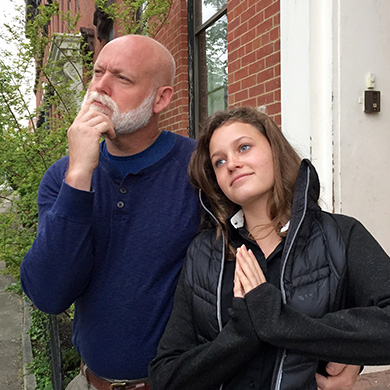

Brown Memorial for the first time this year offered an adult confirmation class, in addition to a confirmation class for 8th and 9th graders. This resulted in some parents and children going through confirmation at the same time, including Will and Annika. The father and daughter share some reflections here about their confirmation experience, ahead of Confirmation Sunday on May 21.
Annika: Honestly, I didn’t really feel I had a choice. It just seemed like the next step for all the kids in my Sunday School group, and my brother had gone through the class when it was his turn a couple years ago. However, I was excited to be taking the class for a couple reasons. First, I wanted to learn more about the church and religion through history because I felt this information would be helpful to me in making decisions about my political convictions, as well as my religious beliefs. The second reason was that I had a lot of questions about my religion and I wanted to understand how our religious community addresses some issues I consider important (such as feminist values) since many bible passages and many prominent Christians seem not to share the same values. Similarly, I was interested to learn more about how scripture encourages or discourages discrimination and violence against those who are queer.
Will: I was confirmed when I was around Annika’s age, so I didn’t feel that attending the adult confirmation class was in any way compulsory. When her brother went through the class two years ago, I was impressed by what he reported to us about the stimulating discussions he had with his peers and the instructors, which I think was very different from the experience I had at that age. As an adult, I decided that the relatively impoverished religious education I had received as a kid left me ignorant about some very important subjects. (I think I learned more about Christianity in a college survey course on art history than I ever did in a church setting.) I’ve done a fair amount of reading in recent years to remedy this deficiency, but I saw the confirmation class as an opportunity to go beyond self-guided study. The opportunity also seemed to be too convenient to pass up, since I could carpool with Annika, and—since she’s more punctual than me—I could get to the class on time, or at least be early for the service.
Annika: I really enjoyed learning about the various theological theories that have been advanced to explain how Jesus’s life and death fulfilled a divine purpose (such as the “moral exemplar” theory and the “scapegoat” theory). These perspectives surprised me, because I hadn’t been exposed to them before, and they weren’t at all what I had expected of how Christians look at the bible.
Will: I don’t think I would say that I was surprised, but I think it’s easy to underestimate how much more interesting every subject is when it’s discussed among a group of intelligent, inquisitive people like the other students in my adult class—and when the discussion is led by Andrew or Tim! Each person in our group brought a different perspective, informed by faith journeys that began in diverse places and followed highly personal trajectories, over a course of decades. Youth confirmation may yield more surprises, because the students may be encountering the subjects for the first time, but examining them in the company of others who have reflected thoughtfully on those topics in light of their lived experiences feels just as revelatory.
Annika: We have not compared our experiences very much besides to figure out if we were covering the same topics (not really, by the way). It seems as though we are following similar curriculum on a different timeline and with different methods of learning and discussion. My confirmation class seems to be less philosophical and I feel as though we are learning through more engaging methods and with fewer school-like tendencies.
Will: I’m deeply hurt that my daughter doesn’t remember all the long, deeply personal conversations we have had in the car talking about Calvinism, early Christian debates about the Trinity, and so on. The iPhone earbuds should have been a dead give-away that she was just pretending to care what her father thinks about such things. Seriously, a big part of my motivation to take the “companion” confirmation class had to do with feeling that I was being a responsible parent who could provide semi-knowledgeable guidance about the topics she was discussing in class. But, from what I could observe, Annika didn’t need much prodding from her parents to embark on her own faith journey earnestly and inquisitively. And, especially since I don’t know where my own journey might take me next, I felt comfortable leaving her travel in the care of the real professionals at Brown Memorial.
Annika: From some of the things my brother had said, I was under the impression that the class might be pretty demanding and intense, like some classes in school. I didn’t need to worry, and future confirmation students shouldn’t worry either. The class is a breeze if you pay attention and participate. There are no grades, and it’s not stressful; it’s essentially regular Sunday School, but with fewer games.
Will: Always let your daughter have the last word when responding to a father-daughter questionnaire from your pastor.